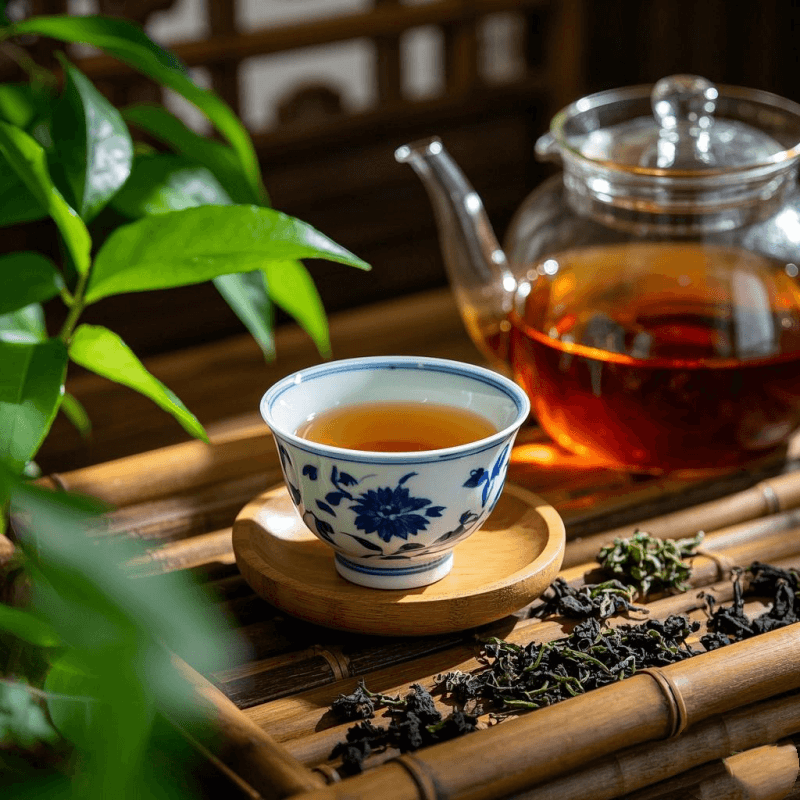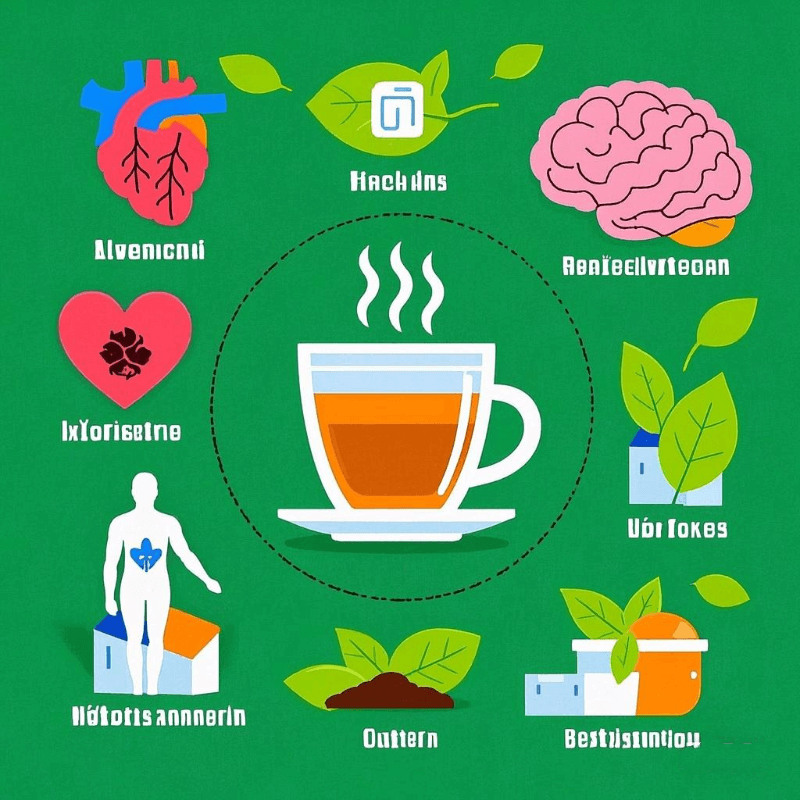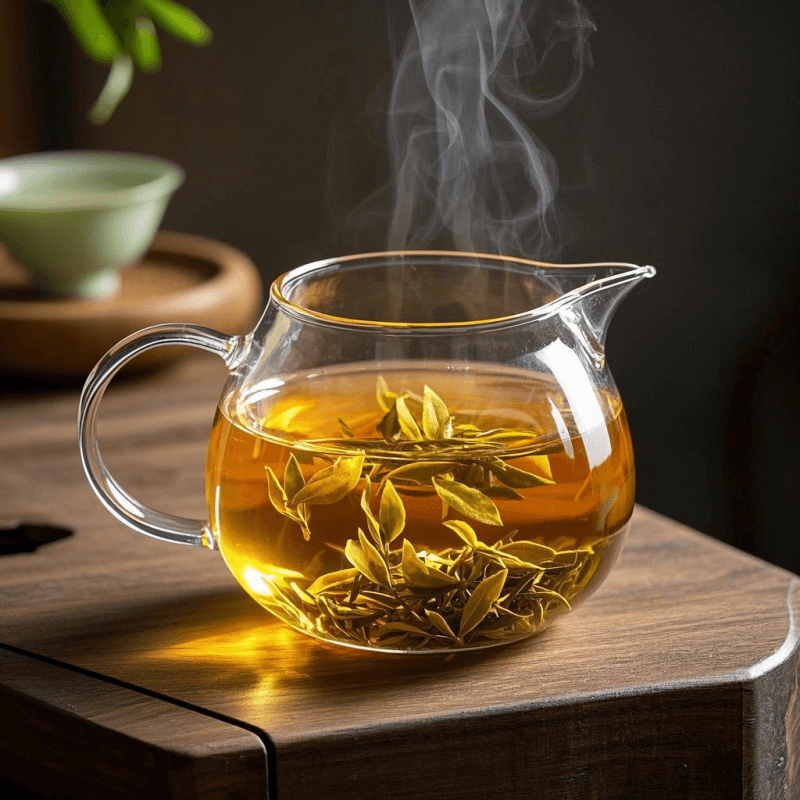In the ever-expanding universe of health-conscious beverages, oolong tea stands as a captivating enigma. The question on many minds: “Is oolong tea good for you?” It’s a query that bridges ancient wellness traditions and cutting-edge scientific research. Unlike its fully oxidized black tea counterpart or the minimally processed green tea, oolong’s semi-oxidized nature crafts a complex chemical profile, hinting at potential health benefits that range from metabolic boosts to mental clarity.

This article embarks on a journey to dissect the science behind oolong. We’ll explore peer-reviewed studies and nutritional data to determine whether this semi-oxidized brew truly lives up to its reputation as a health elixir. If you’ve ever wondered about the impact of this ancient tea on your modern lifestyle, read on to uncover the truth.
1. Introduction: Why People Ask “Is Oolong Tea Good for You?”
The intrigue surrounding “Is oolong tea good for you?” stems from oolong’s unique position in the tea spectrum. Its partial oxidation process strikes a delicate balance, preserving the fresh, vibrant compounds of green tea while developing the rich, complex flavors of black tea. But does this equilibrium extend to health benefits?
Traditional Chinese medicine has long championed oolong tea for digestion and vitality. Fast forward to today, and contemporary research, such as studies published in the Journal of Nutritional Biochemistry, is shedding light on how oolong’s polyphenols and caffeine collaborate to offer advantages beyond basic hydration. As individuals increasingly seek natural wellness solutions, oolong’s status as a “health tea” grows—but what does empirical evidence reveal?
2. What Nutrients Make Oolong Tea Beneficial
To truly answer “Is oolong tea good for you?”, we must first examine its nutritional composition. An 8-ounce cup of this semi-oxidized tea contains:
- Polyphenols (300–400mg): Comprising catechins like EGCG, theaflavins, and thearubigins, these act as potent antioxidants.
- Amino Acids: With L-theanine taking the spotlight, promoting relaxation without drowsiness.
- Caffeine (30–50mg): A moderate stimulant that enhances alertness.
- Minerals: Trace amounts of fluoride, potassium, and manganese.
The Antioxidant Powerhouse
A 2021 analysis in Antioxidants revealed that oolong tea boasts an oxygen radical absorbance capacity (ORAC) comparable to blueberries. These antioxidants combat free radicals, key culprits in cellular damage and aging, suggesting a strong case for oolong’s health benefits.
L-Theanine: The Calming Complement
The combination of caffeine and L-theanine in oolong creates a unique effect. L-theanine crosses the blood-brain barrier, increasing GABA levels and fostering relaxation. As Dr. Sarah Chen, a nutrition researcher, puts it: “The caffeine-theanine ratio in this semi-oxidized tea offers focused energy without the crash, making it an ideal daily choice.”
3. Scientifically Backed Health Benefits of Oolong Tea

Numerous studies provide compelling evidence in response to “Is oolong tea good for you?”
1. Enhanced Antioxidant Defense
A 2019 trial in Phytomedicine found that daily consumption of this tea increased blood antioxidant enzymes by 15–20% after 12 weeks. Higher antioxidant levels may lower the risk of chronic diseases like heart disease and certain cancers.
2. Improved Metabolism and Weight Management
A landmark 2009 study in The American Journal of Clinical Nutrition showed participants who drank oolong daily lost an average of 3.5 pounds over 6 weeks. Caffeine and EGCG in this brew may boost calorie burning and inhibit fat absorption.
3. Cardiovascular Support
A meta-analysis in Journal of Functional Foods linked oolong consumption to a 7–10% reduction in LDL cholesterol and lower blood pressure. Polyphenols in the tea improve blood vessel elasticity and reduce arterial plaque buildup.
4. How Oolong Tea Supports Weight, Heart, and Mental Health
Weight Management: More Than a Metabolism Boost
When considering “Is oolong tea good for you?” in terms of weight, the benefits extend beyond calorie burning:
- Appetite Regulation: L-theanine may reduce stress-eating by lowering cortisol levels.
- Blood Sugar Control: Studies show oolong can improve insulin sensitivity, preventing blood sugar spikes.
Heart Health: A Sip for Circulatory Wellness
- HDL Cholesterol: Oolong tea increases “good” cholesterol by 4–6%, aiding in the removal of “bad” cholesterol from arteries.
- Blood Vessel Health: Theaflavins in oxidized oolongs enhance endothelial function, reducing stroke risk.
Mental Health: Calm Focus in a Cup
- Anxiety Reduction: L-theanine’s impact on GABA can alleviate anxiety, especially in high-stress situations.
- Cognitive Performance: A 2018 study in Nutrients found oolong drinkers had better memory and reaction times than coffee drinkers, thanks to the caffeine-theanine synergy.
5. How Much Oolong Tea Is Healthy to Drink
While evidence supports the health benefits of this semi-oxidized tea, moderation is key. The FDA recommends limiting daily caffeine intake to 400mg, translating to:
- Light Oolong (30mg/cup): 10–12 cups daily
- Dark Oolong (50mg/cup): 6–8 cups daily
Optimal Consumption Tips
- Spread Out Intake: Sip this tea in 2–3 sessions throughout the day to avoid caffeine overload.
- Morning or Afternoon: Finish consumption by 3pm to prevent sleep disruption.
- Brewing for Benefits: Steep at 185–205°F for 2–3 minutes to maximize polyphenol extraction.
For therapeutic benefits, try gongfu brewing. Discover the health-boosting potential of oolong tea from premium leaves, sourced from high-altitude gardens where nutrients thrive.
6. Who Should (or Shouldn’t) Drink Oolong Tea
Ideal for:
- Caffeine Sensitives: With 30–50mg of caffeine per cup, it’s a gentler option than coffee.
- Weight-Conscious Individuals: Its metabolism-boosting properties make it a smart alternative to sugary drinks.
- Stress Managers: L-theanine offers calm focus, perfect for high-pressure environments.
Caution for:
- Pregnant/Nursing Women: Limit to 1–2 cups daily due to caffeine concerns.
- Anemia Sufferers: Tannins in oolong may inhibit iron absorption; drink between meals.
- Sleep Disorders: Avoid evening consumption to safeguard sleep quality.
“While generally safe, those on blood thinners or antidepressants should consult a doctor,” advises nutritionist Lisa Wang. “Polyphenols may interact with certain medications.”
7. Conclusion: Make Oolong Tea Part of Your Wellness Journey

After exploring the science, the answer to “Is oolong tea good for you?” is a definitive yes. Backed by centuries of tradition and modern research, this semi-oxidized tea offers a unique blend of benefits for heart health, weight management, and mental clarity.
Oolong’s versatility—from light, fresh varieties to robust, dark brews—makes it a perfect fit for any wellness routine. Whether you seek morning energy or afternoon relaxation, incorporating this tea into your daily life is a delicious step towards better health.
Ready to experience these benefits firsthand? Browse our curated oolong tea collection tailored for health-conscious sippers. Each cup is not just a beverage but a science-backed journey to wellness. Cheers to a healthier you with every sip!

Pingback: Dong Ding Oolong Tea: Taiwan’s High-Mountain Brew with Creamy Flavor